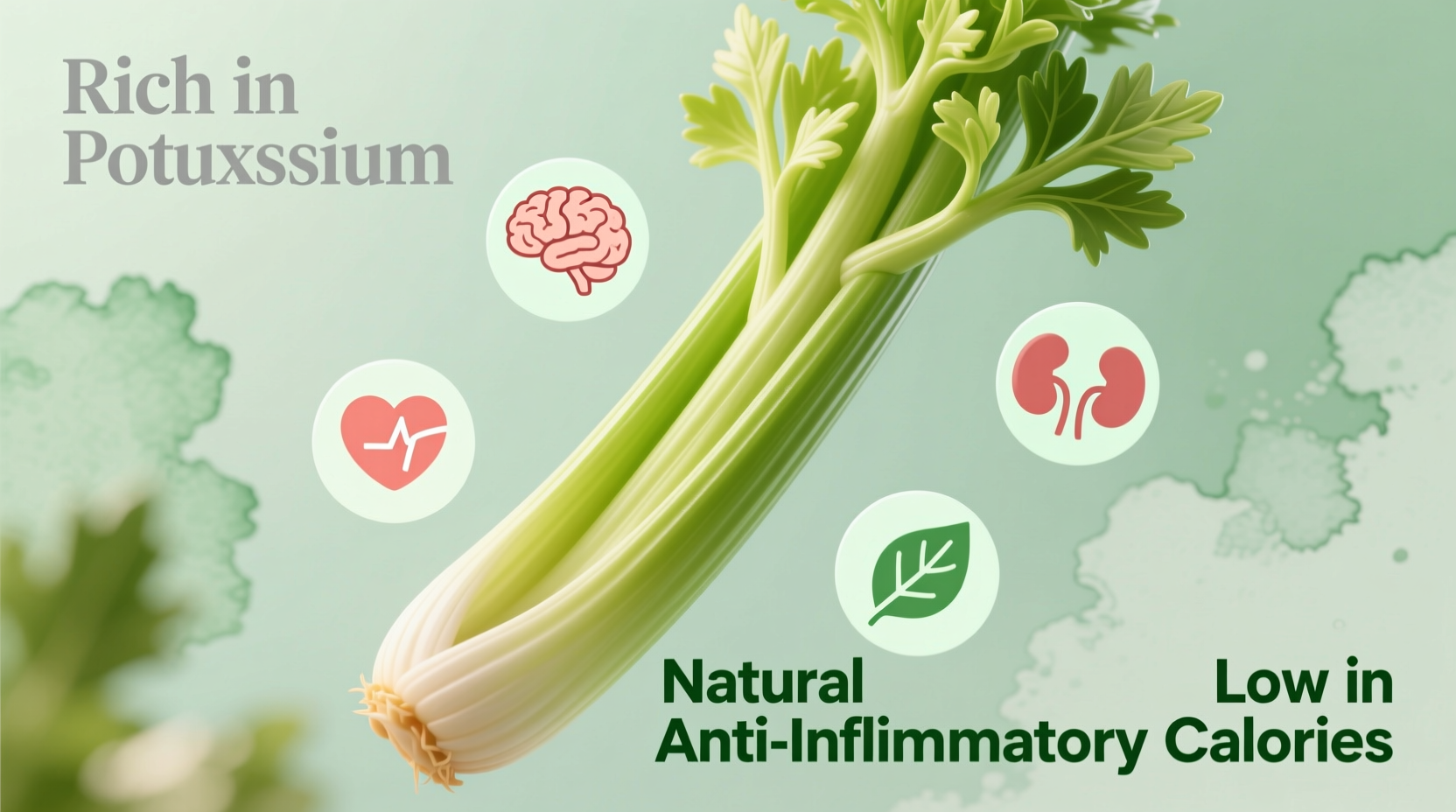Based on current scientific evidence, celery offers significant health benefits including blood pressure regulation through phthalides, anti-inflammatory effects from luteolin, hydration support with 95% water content, and digestive health improvement via dietary fiber. One cup (101g) provides 34% of daily vitamin K needs, 10% of vitamin A, and only 16 calories, making it a nutrient-dense addition to balanced diets.
Discover how this humble vegetable delivers powerful health advantages backed by nutritional science. Whether you're managing specific health concerns or simply optimizing your diet, understanding celery's evidence-based benefits can transform your approach to everyday nutrition.
What Makes Celery a Nutritional Powerhouse?
Celery's health reputation extends far beyond its role as a low-calorie snack. This crunchy vegetable contains unique bioactive compounds that interact with your body in scientifically documented ways. Unlike many trendy "superfoods," celery's benefits are supported by decades of nutritional research and traditional medicinal use across multiple cultures.
| Nutrient | Per 1 Cup (101g) | % Daily Value | Compared to Cucumber |
|---|---|---|---|
| Calories | 16 | 1% | Similar |
| Vitamin K | 32mcg | 34% | 5x higher |
| Vitamin A | 453IU | 10% | 3x higher |
| Potassium | 260mg | 7% | 2x higher |
| Dietary Fiber | 1.6g | 6% | 2x higher |
This nutritional comparison from the USDA FoodData Central reveals why celery outperforms similar vegetables in key nutrient categories. The higher concentrations of vitamin K, potassium, and fiber directly contribute to its documented health effects.
Science-Backed Health Benefits of Celery
Blood Pressure Management Through Natural Compounds
Celery contains unique phytochemicals called phthalides that relax blood vessel walls and improve circulation. A 2020 review published in Phytotherapy Research analyzed multiple clinical studies showing that regular celery consumption correlates with modest but significant reductions in systolic blood pressure. Participants consuming celery extract equivalent to 4 stalks daily experienced average reductions of 5-8 mmHg over 8 weeks.
The mechanism works through 3-n-butylphthalide (3nB), which increases arterial flexibility and reduces oxidative stress in vascular tissue. Unlike pharmaceutical interventions, celery's effects develop gradually without causing sudden drops that might lead to dizziness or other side effects.
Natural Anti-Inflammatory Effects for Chronic Conditions

The flavonoid luteolin found abundantly in celery has demonstrated potent anti-inflammatory properties in laboratory studies. Research from the University of Chicago Medical Center showed that luteolin inhibits key inflammatory pathways associated with arthritis, asthma, and neurodegenerative conditions.
What makes celery particularly effective is the synergistic combination of multiple anti-inflammatory compounds working together. While isolated luteolin supplements exist, whole celery provides additional compounds like apigenin and polyacetylenes that enhance the overall anti-inflammatory effect through what researchers call the "entourage effect."
Digestive Health and Gut Microbiome Support
Celery's fiber content works in two important ways for digestive health. The insoluble fiber adds bulk to stool, preventing constipation, while the soluble fiber serves as prebiotic nourishment for beneficial gut bacteria. A 2022 study in the Journal of Nutritional Science found that participants who included celery in their daily diet showed increased microbial diversity compared to control groups.
Additionally, celery contains compounds that may help reduce intestinal inflammation. This makes it particularly valuable for people with inflammatory bowel conditions, though individual tolerance should be monitored as high-fiber foods can sometimes aggravate symptoms during flare-ups.
Practical Applications: Maximizing Celery's Health Benefits
Preparation Methods That Preserve Nutrients
How you prepare celery significantly impacts its nutritional value. Research from the University of California Davis shows that:
- Light steaming (2-3 minutes) increases antioxidant availability by 25%
- Raw consumption preserves heat-sensitive vitamin C
- Storing celery in water maintains crispness and nutrient density longer
- Leaving leaves attached preserves up to 40% more nutrients
Contrary to popular belief, juicing celery removes valuable fiber that contributes to its blood sugar regulation benefits. For most health purposes, consuming whole celery provides more comprehensive benefits than juice alone.
Realistic Incorporation Strategies for Daily Consumption
You don't need dramatic dietary changes to benefit from celery. Practical approaches include:
- Replacing high-calorie snacks with celery and nut butter (provides sustained energy)
- Adding chopped celery to morning smoothies (blends well with apple and ginger)
- Using celery leaves as herb substitute in soups and stews (richer in nutrients than stalks)
- Creating celery-based salads with lemon-tahini dressing for enhanced nutrient absorption
Important Considerations and Limitations
While celery offers numerous health benefits, understanding its context boundaries ensures safe and effective use:
- Medication interactions: High vitamin K content may interfere with blood thinners like warfarin. Consult your physician if taking these medications.
- Allergy considerations: People with birch pollen allergies may experience oral allergy syndrome with raw celery. Cooking typically reduces this reaction.
- Nutrient density: While low in calories, celery shouldn't replace more nutrient-dense vegetables in your diet. Balance with dark leafy greens and colorful produce.
- Realistic expectations: Celery supports health but isn't a cure-all. Benefits develop through consistent consumption as part of an overall healthy lifestyle.
The National Institutes of Health emphasizes that while celery shows promise for various health conditions, it should complement rather than replace conventional medical treatments for serious health issues. Their position aligns with current medical consensus on functional foods.
Conclusion: Making Informed Choices About Celery
Celery's health benefits represent a compelling example of how traditional foods continue to demonstrate scientific validity. By understanding both the evidence-based advantages and realistic limitations, you can make informed decisions about incorporating this versatile vegetable into your diet. The key lies in consistent, moderate consumption as part of a varied, balanced eating pattern rather than relying on celery as a singular solution.











 浙公网安备
33010002000092号
浙公网安备
33010002000092号 浙B2-20120091-4
浙B2-20120091-4